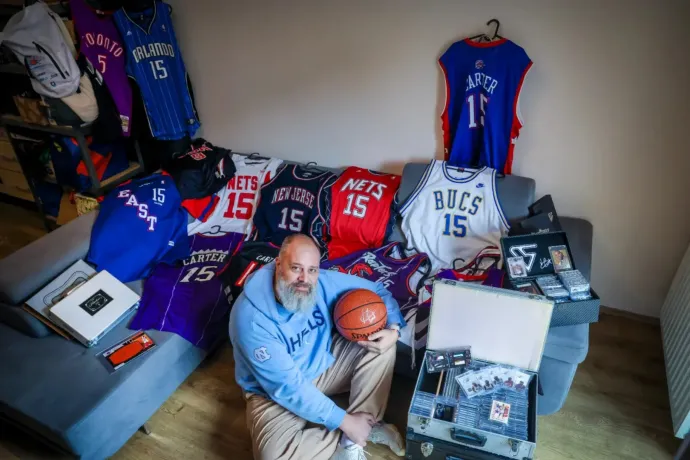
Dávid Tasnádi, one of the best-known figures in the Hungarian NBA card-collecting community, has been building his unique collection – which now numbers more than ten thousand items – for more than twenty years. He is one of the biggest, if not the biggest, Vince Carter collectors on the scene, and his collection is recognized internationally. For him, collecting is not a business, but a consciously built oeuvre with emotional value, which he plans to display in a special location one day.
Dávid Tasnádi first encountered NBA cards as a secondary school student. He played basketball with a boy whose parents had brought him a few packs from Germany. His first card featured Dennis Rodman (from the German-language Collector's Choice series available at the time). The first pack he bought with his pocket money contained Michael Jordan USA- jersey cards (1991-92 Skybox), which set him on the path to starting his collection.
In the mid-1990s, sports cards were relatively easy to obtain in Hungary. In 1994, a local company imported packs from Collector’s Choice, Upper Deck, Fleer, and Skybox, flooding the country with them; they were available at almost every newsstand. This was when the first specialised stores were established, and weekend exchanges spontaneously formed in stores. People traded cards around Petőfi Hall, a leisure centre, and many travelled from the countryside just to trade cards.
"At that time, there were probably around 200-300 active collectors, but then that number began to grow rapidly," says Tasnádi. Initially, collectors got their information about NBA from newspapers and German television broadcasts. Most of them were looking for cards featuring players from the Chicago Bulls or Los Angeles Lakers, as these were the best known. Trading was based on which player or team you liked, because in the pre-Internet era, it was difficult to determine the real market price of a card. In the early 2000s, after Jordan's retirement led to a decline in the popularity of the NBA for a while, collecting also saw a decline. The market was later revived by online marketplaces, primarily eBay.
American cards that were previously difficult to obtain became available, and speculation began: "During the pandemic, you could buy a card in the morning, and by evening it would be worth eight times as much, even though the card hadn't even arrived yet," Tasnádi recalled. The value of the cards is determined by several factors. It is important who is featured on it, what pack it comes from, how rare it is, and whether it is a rookie card.
The market is quite stratified in terms of price range, with affordable starter sets (such as Hoops), mid-range products, and high-end packages that may cost up to several thousand dollars. "For example, a rare card pulled from a cheaper pack may be worth $200, while a rare card by the same player from a premium series may be worth thousands," says the collector, adding that the market can also be quickly influenced by player performance.
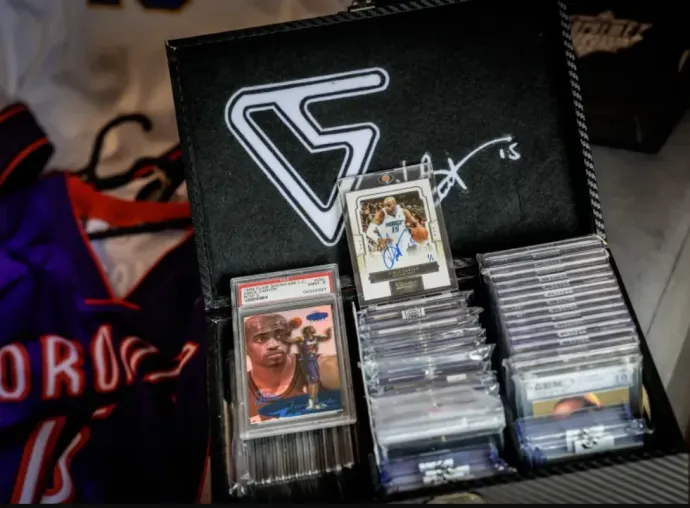
Similarly to the stock market, an exceptionally good performance can quickly cause price movements. Jordan, Kobe Bryant, and LeBron James cards, among others, represent stable values in the long term. In contrast, cards of new players are highly speculative: Stephen Curry's rookie cards, for example, were worth a few dollars at the beginning of his career, but today they are worth thousands. He believes that cards of European players such as Nikola Jokić and Luka Dončić are still undervalued on the American market, as in his experience, American collectors tend to prefer American stars.
The Hungarian community now has thousands of members and is very active online. The groups typically use eBay selling prices as a guide, but customs duties, VAT, and postage costs also influence prices in Hungary. The activities of resellers—who buy for commercial purposes—often drive up prices.
However, Tasnádi is not one of them: “I am a collector, not a dealer. I often give cards as gifts if I know that someone has been looking for one for a long time. It is more important for me that it ends up in a collection than to make money from it.” However, there is also a downside to the market, as fake cards often appear in various online groups. After two decades of collecting, he says that his hobby has become a way of life, in which not only the passion for collecting but also building community and sharing knowledge play an important role.
He believes that the world of NBA cards is about nostalgia, investment, and passion at the same time, but it also requires serious knowledge, time, and energy from those who want to get involved not just as hobbyists, but in a way that creates value. In his opinion, card collecting is by no means a quick way to make money. The market operates on a tight network of connections: "If someone new comes in and wants to sell, say, a Kobe rookie card, they'll probably only be able to sell it for less than I can, because I have the connections and the reputation." He knows who collects cards of a particular player, who might be missing a card, and how to get in touch with them.
According to him, the world of NBA cards is just like a business: you have to invest, learn the market, and accept that there will be a learning curve. There are huge differences between one collector and another. You can collect based on many different attitudes or approaches. If you want to collect cards of the top stars, you usually have to dig deeper into your pockets. "You need a fat wallet for Jordan. Pipen also has some expensive cards, but they can't compare to Jordan's," he says. He himself, for example, only collects select Dream Team Jordan cards. His goal is not to acquire every card related to Jordan, because that would be an impossible task.
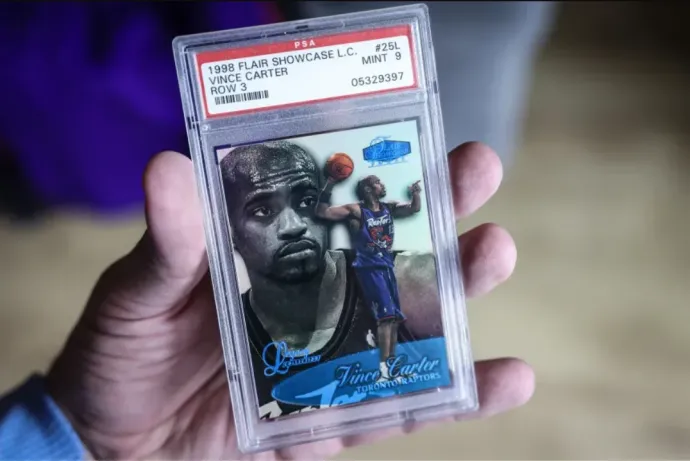
The collector has been following Vince Carter's career since 1995 and has been collecting his cards since 1998, when he entered the NBA, focusing primarily on this collection. However, there was a brief period when he sold his collection. Later, when he started again, he was able to buy back a significant part of his old collection in one lump purchase, which gave him a good foundation, and he has been expanding it ever since.
For him, collecting is not just a hobby, but also a personal connection to his family: one of his most important cards, a 5-fold booklet card, is intended for his son, Vince, which he bought when he was born and would never sell. There are only five of these cards in the world. When he bought it, this card was worth around 250,000 forints, but today its value could be in the millions. Tasnádi's collection has grown to an astonishing size: his Vince Carter collection alone has more than 4,500 cards, 70-80 of which are one-of-a-kind cards, meaning there is only one copy in existence.
He probably has the world's largest Vince Carter collection.
His entire collection, which includes complete sets as well as sub-collections of Dean Smith, Phil Jackson, Michael Jordan, Cristiano Ronaldo, Yoda, and Tiger Woods, numbers more than ten thousand items. He keeps track of everything in Excel so he doesn't buy duplicates, but he knows most of his cards by heart anyway. "If I sold everything, I could buy a few properties in Budapest," he says, half-jokingly. The collection often comes with stories, which Tasnádi recounts with passion. For example, the Mark Jackson card with the infamous Menendez brothers in the background. This discovery increased the price of the card a hundredfold overnight. Or how the value of a Ja Morant card skyrocketed when someone noticed that the photo showed two well-known rappers sitting in the audience.
"These hypes are what make the market so special. Sometimes a small detail is enough to turn a completely ordinary card into an iconic piece," says Tasnádi, who says that the value of his collection cannot be measured in money. There are cards that he could never part with. For example, the one he bought when his son was born, or the five-piece "flawless" Carter set, which shows the player in five different jerseys. "Shortly after I started collecting again, my then-wife gave me the 500th card for Christmas. That's another piece I would never sell," he added.
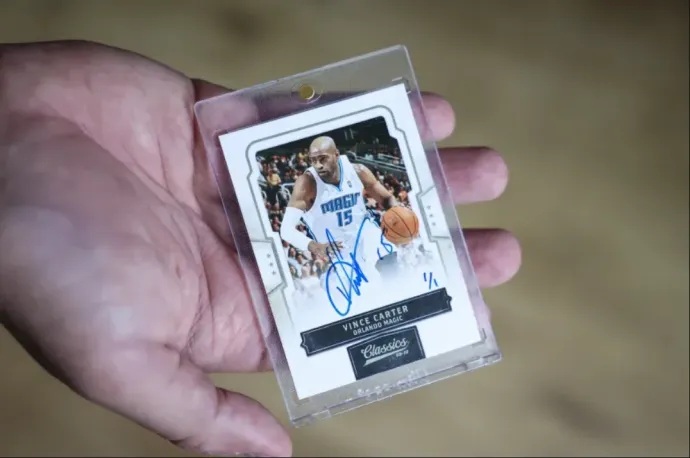
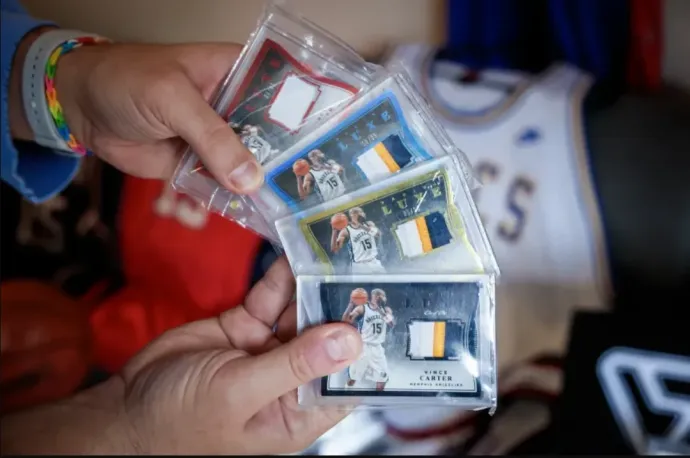
Besides Vince Carter, his collecting interests are quite diverse. He has seen many cards during his collecting career, but only those that make it into his collection stick with him. He told a rare story about a 1999 Topps Finest Gold Retractor card, which came to him in an adventurous way, and since then many people have wanted to buy this Duncan-Iverson-Carter card, of which only 50 exist, but he himself has only encountered a few copies so far. Authenticity is also important for Tasnádi: constant attention is needed due to counterfeits, which mainly appear on the Asian market and in the case of American cards.
These counterfeits are flagged in blog posts and group alerts to community members so that novice collectors don't fall for the scams. Among the elite, internationally recognised collectors, the rapid flow of information allows them to be the first to know about the most important events and the availability of rare cards. When asked whether authentication can prevent counterfeiting, he replies that only a few prominent companies carry out verification activities that have a market value-enhancing effect. Beckett, PSA, and MCG are companies that use their reputation to ensure the authenticity of cards, although mistakes can happen even with them.
Appraisals carried out by smaller authentication companies are not relevant among collectors, so the value of such cards may be significantly lower. In his opinion, when collecting, it is important to set a goal for ourselves. Some people collect all the cards of a particular player, while others focus on series or teams. He recommends that novice collectors first get informed, read up on the subject, and approach the hobby with a clear head and specific goals, as counterfeits and overpriced cards have multiplied on the market since Covid. The basic principle of collecting is that it is not worth buying the first available item and that it is only worth purchasing cards from reliable sources.
The Internet has made access much easier; today, it is possible to contact American collectors or foreign shops at any time, and online shopping also speeds up the acquisition of rare cards. At the same time, due to the opacity of the market and since committing fraud via faceless profiles is so easy, beginners need to proceed with caution. When collecting, rare rainbow series and limited edition 1/1 cards are particularly valuable, and competition among collectors makes them increasingly difficult to obtain.
Today, Tasnádi not only collects, but also actively helps others navigate this world. He created thecollectorsbest.com so that new collectors could learn about the market. He also regularly attends card exchanges, where he enjoys talking to collectors and helping newcomers find their way around. "When a mum or dad comes with their child, I try to protect them from being ripped off right away. Unfortunately, there are people everywhere who take advantage of the inexperience of newcomers," he adds. When asked about the recently held Budapest Card Show, he tells us that he considers fairs to be very important: they provide a great community experience, and he never comes home empty-handed from such events, always finding something special and receiving many cards as gifts from other collectors or followers.
In addition to collecting, Tasnádi also focuses on preservation. There are cards that he buys because he wants to save them so that they end up in a good place, in collections. He does not sell from his collection, only from his exchange cards, but he treats these on a community basis: if someone is really looking for a card and cannot exchange it, they can buy it from him to add to their own collection. The huge collection is now difficult to document and cannot be sold as a whole, so Tasnádi plans to donate it to Vince Carter's foundation, the Embassy of Hope, in the long term. "I wrote to them that if they ever built a museum for Carter, I would give them my entire collection. It's so big that there's no other way to treat it with the respect it deserves," he said. Although he has not yet received a response, he feels that this would be the best outcome for the collection he has built over more than two decades.
For more quick, accurate and impartial news from and about Hungary, subscribe to the Telex English newsletter!